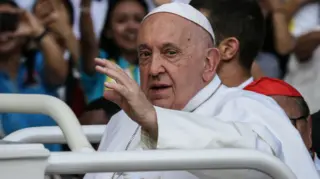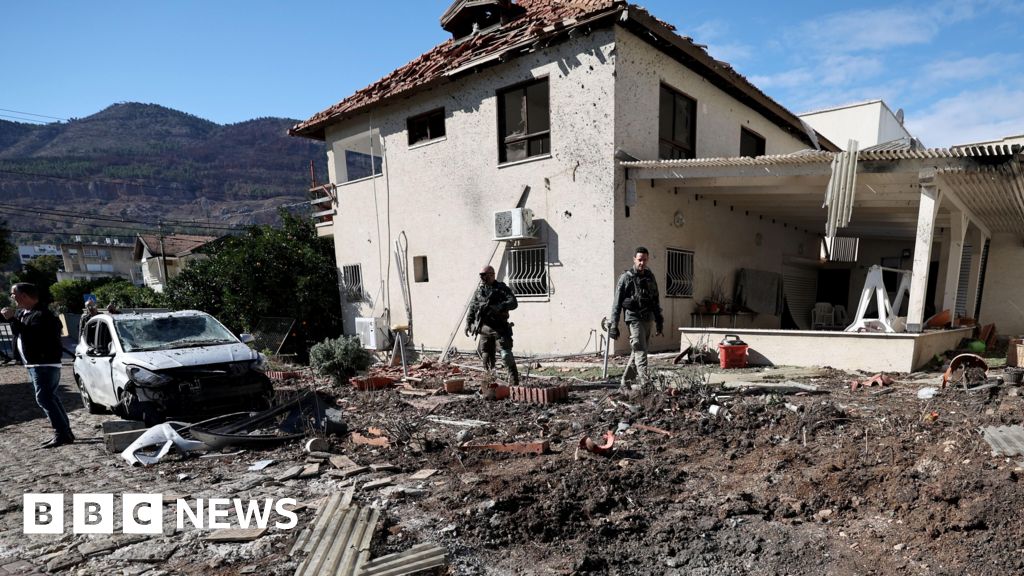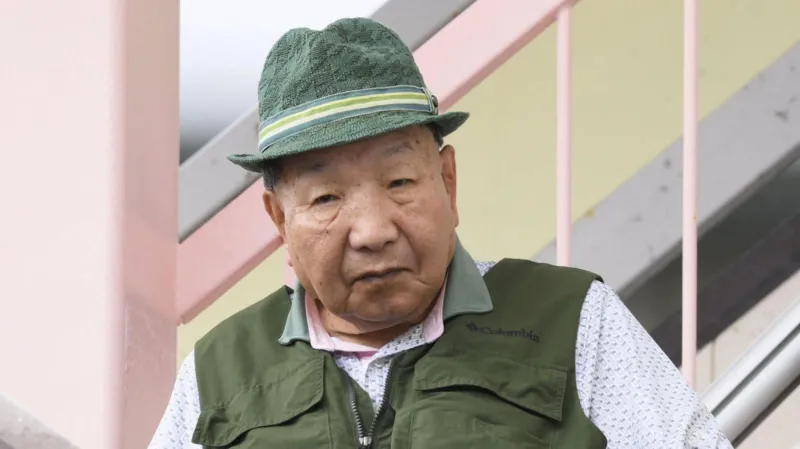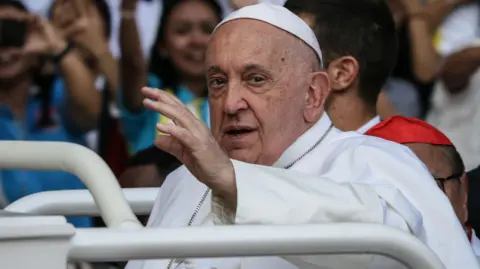 EPA-EFE/REX/Shutterstock
EPA-EFE/REX/ShutterstockSingapore’s grandest arena, which has hosted Taylor Swift and Madonna, is getting ready to welcome an arguably bigger icon – Pope Francis.
The pontiff will celebrate Mass with 50,000 people at the National Stadium on Thursday evening, packing the venue as his 12-day Asia-Pacific tour draws to a close.
The 87-year-old has been to Indonesia, Timor-Leste and Papua New Guinea – the visit to the Pacific Island was the furthest he has travelled to meet devotees.
He arrived in Singapore, where less than 10% of the population – around 400,000 people – identify as Catholic, on Wednesday afternoon. The three-day visit includes meetings with government officials, religious leaders and students.
This has been the longest foreign visit of his papacy and given his frail health, volunteers say the visit was unimaginable just a year ago. A spell of illness at the time had made overseas travel difficult, forcing him to cancel a trip to the UAE.
“Since we were told that he was coming [to Singapore], we’ve been praying,” says Karen Cheah, one of 5,000 volunteers who have been recruited for duties ranging from singing in the choir during Mass to protecting the Pope.
“Once he got on the plane and visited the other countries, the reality hit that it’s coming up: we are next.”
Hosting the Pope for even a single evening – as the stadium will – is no small feat.
It is a hive of activity the day before Mass. The pitch is covered with rubber flooring. The rows of chairs are growing as workers unload more of them.
At the other end of the arena, the choir is rehearsing hymns at full volume under the close watch of directors, the sound clashing with the routines being practised by the hosts of the event.
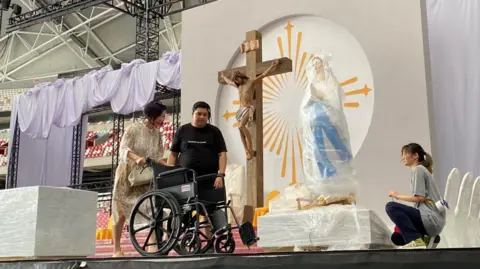
One volunteer is going through the sequences for Mass while manoeuvring an empty wheelchair. Pope Francis is expected to use a wheelchair for most engagements because of a knee ailment.
Meanwhile security volunteers are working with the police to secure an area around the Pope and guard where he is staying in Singapore.
These volunteers have completed weeks of training, where they learned skills including how to disengage from a tight grip and respond to a knife attack.
“Because of the current heightened sense of security, the police have been very active in working with us,” says Kevin Ho, who heads the security volunteer team.
“Our volunteers have been having sleepless nights, doing the operational work. We are trying to make the visit as safe and successful as it can be.”
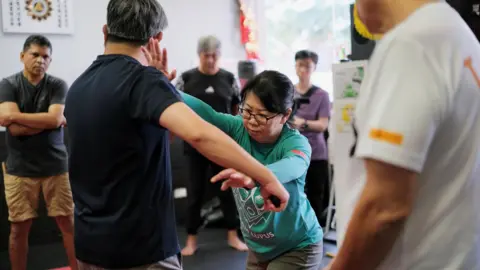 Roman Catholic Archdiocese of Singapore
Roman Catholic Archdiocese of SingaporeThe precautions have also increased because of a recent threat. Seven people were detained in Indonesia last week over a failed plot to attack the Pope. Police said they had confiscated bows, arrows, a drone and leaflets purportedly linked to the Islamic State militant group.
The Pope, born in Buenos Aires as Jorge Mario Bergoglio, is known to be unafraid to address issues including LGBT+ inclusion and inter-religious tensions. On this trip, he made a joint call for peace in Jakarta alongside the grand imam of Southeast Asia’s largest mosque and met other religious leaders.
He praised Indonesians for choosing to have large families over pets, a seeming comment on plummeting birth rates in China, South Korea and Japan. But his figures that Indonesian parents are having up to five children were decades out of date, commentators pointed out. Indonesian women now have on average only slightly more than two children in their lifetime, UN data shows.
In resource-rich Papua New Guinea, which has been drawing international companies and investors, the Pope called for workers to be treated fairly. And in Timor-Leste, he said young people should be protected from abuse, after a prominent local bishop was accused of sexually abusing young boys there during the 1980s and 90s.
“Of course, the Pope has a message. But at the same time, he is also the message,” says Monsignor Stephen Yim, co-chair of the organising committee at the Roman Catholic Archdiocese of Singapore.
This is Singapore’s second papal visit.
The late Pope John Paul II spent just five hours in the city state in 1986, which included officiating Mass at the old National Stadium.
Mr Ho, who was a student then, remembers that day well. He says the crowd roared as the pontiff made a lap of the venue in the popemobile, undeterred by the rain.
“The old stadium had no roof and we all got rained on,” Mr Ho recalls. “The only emotion I remember was that palpable sense of excitement when the Pope came around. It was electric. I will never forget that.”
Demand for Thursday’s Mass was also high – almost half of those who tried to get a seat were unsuccessful. Those who were unlucky received a reply with an emoji and verse from the Bible.
“Seeing the Pope in person feels like a once-in-a-lifetime opportunity,” says Stephanie Yuen, who managed to get a seat at the stadium. “As a Catholic, that’s something I don’t want to miss, especially in my own country.”
The Mass will be “a very profound spiritual experience that I will get to share with thousands of my fellow Catholics in Singapore”, says Sherilyn Choo, another thrilled attendee.
The visit has also touched non-Catholics, such as carpenter Govindharaj Muthiah, who built two chairs for the Pope’s use in Singapore.
“Tensions around the globe are quite high. It’s heartwarming that he made trips to countries with many different religions,” Mr Muthiah says. “Unity is the message he is putting across.”
